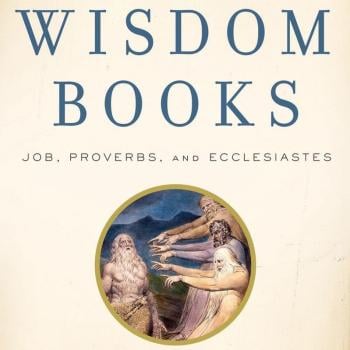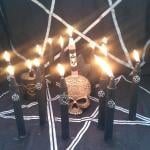 The phone rang, the email came, and a book landed on my doorstep last week. Now this happens all the time at this household, but this book was different. It was the proofs of the new book by Pope Benedict on the life of Jesus, entitled Jesus of Nazareth: Holy Week: From the Entrance into Jerusalem to the Resurrection (St. Ignatius Press, 2011, 362 pages, $14.67 in hardback). What was extraordinary about the contact was that the publicist or press secretary contacting me said I would be the only Protestant taking part in the teleconference on Ash Wednesday about this new book. 4 Catholic scholars, Jacob Neusner, and myself— c’est fini. Of course I had to read and digest the book jiffy quick, but I was willing to do that, as I considered this an honor. Somebody out there must trust me as an exegete and a theologian.
The phone rang, the email came, and a book landed on my doorstep last week. Now this happens all the time at this household, but this book was different. It was the proofs of the new book by Pope Benedict on the life of Jesus, entitled Jesus of Nazareth: Holy Week: From the Entrance into Jerusalem to the Resurrection (St. Ignatius Press, 2011, 362 pages, $14.67 in hardback). What was extraordinary about the contact was that the publicist or press secretary contacting me said I would be the only Protestant taking part in the teleconference on Ash Wednesday about this new book. 4 Catholic scholars, Jacob Neusner, and myself— c’est fini. Of course I had to read and digest the book jiffy quick, but I was willing to do that, as I considered this an honor. Somebody out there must trust me as an exegete and a theologian.
The first thing to be said, is that this book is in fact the completion of a project that the Pope has been engaged in for some time. The first volume came out in 2007 (415 pages). While each of these books can stand on their own, it is better to read them together. What they reveal is something most of us already knew— that the Pope both now and when he was Cardinal Joseph Ratzinger is a considerable exegete and theologian. He is in fact a scholar. One may suggest he is certainly the most scholarly Pope when it comes to the Bible, in my life time, and even longer than that. There is in fact of course a very long tradition of scholarly clergy in the Catholic Church. I remember well being part of the SNTS meeting in Milano in the 1990s when my wife and I had dinner at Cardinal Martini’s residence. He was a considerable expert in text criticism. One could only wish there were more Protestant clergy who are also Biblical scholars—- but alas, there are not that many (Eugene Peterson is a decided exception).
So what should we think about this new book from the Pope? Firstly, I can assure you it is in excellent English, and the book seems remarkably free of any kind of typos. It is also written at a level that the educated lay person as well as the clergy or scholars can get a lot out of it. At the level of communication, it is certainly clear and interesting. It also comes with bibliography, and extensive glossary, and helpful indexes. It is not a weighty tome in some obscure scholarly diction.
Secondly, the Pope is polymath, by which I mean, he is conversant in philosophy, theology (ancient and modern), exegesis, and a variety of other subjects. He knows his Bible inside and out as well. I enjoyed reading this book, and I learned a good deal from it (see some of the brief citations below). In this book the Pope explores the whole of Holy Week from Palm Sunday through Easter Sunday and beyond, stopping to discourse on all the significant events that took place, and the major things Jesus said and did along the way. If I had one desideratum it is that I wish the Pope had had time to read more of the best of Biblical scholarship that has emerged in the last 30 years. The scholars he cites range from two of my Protestant teachers and influences, C.K. Barrett and Martin Hengel, to Rudolph Bultmann and Rudolph Schnackenburg and a variety of other scholars of the previous generation who have not written anything in the last couple of decades really. To be fair, doubtless the Pope was more than a little busy in the last few years while he was completing this book. Nevertheless, there is some very incisive exegesis and theologizing in this book, and Bultmann and others come in for some pretty serious criticism. As you might expect, the Pope is not a liberal Protestant exegete, to state the obvious.
What is also true, however, is that the Pope is decidedly a post-Vatican II exegete. By this I mean, he does not just interact with older Catholic scholars (though he certainly has a predeliction for folks like A. Feuillet the great French exegete), he also interacts with a variety of Protestant exegetes as well. and furthermore, he is fully conversant with historical criticism of various forms (form, source, narrative criticism etc.) but he is concerned to get beyond such ways of analyzing the text and focus on its theological and also historical substance. This is to be commended. His approach is not pre-critical, nor is it done simply in the tradition of historical Catholic or patristic scholarship but in fact is post-critical in a helpful and healthy way. His judgment is that historical criticism, which should continue to go on, has nonetheless offered most of what it has to offer already. And at the same time, the Pope is concerned about the spiritual food that one can find in the text. His is not a dry abstract scholarly discussion. Indeed, a good deal of what he says will preach.
Let’s consider some brief sound bytes. On the one hand, no one will be surprised that it is the Gospel of Matthew and the Gospel of John that are most heavily used to reconstruct the final week of Jesus’ life, since those two Gospels have historically been the most focused on in Catholic exegesis and theology. And likewise, no one is surprised that a sacramental approach is taken to a good deal of the Fourth Gospel especially, even though as my Doctor Vater C.K. Barrett, says, the Fourth Gospel is not about Christian baptism and the later practice of the Lord’s Supper. In fact, it doesn’t even mention the ‘words of institution’ ‘This is my body’ or ‘This is my blood’. Yet, it must be admitted that such traditional Catholic ways of viewing these Gospels is not so over-powering that a Protestant might be put off or feel that some kind of dogmatic grid was being imposed on the text. Much of the interpretation of the NT text itself could have been done by a good exegete from any orthodox Christian tradition.
Perhaps for a moment it will be worth mentioning some things we learn about the Pope himself. Firstly, he is not an Augustinian (or as Protestants tend to call such folk, a Calvinist). Secondly, he certainly believes in salvation by grace through faith and he honors the recent accords between Lutherans and Catholics on the doctrine of justification. This is not the Pope that Luther faced by any means, if we are talking about how salvation is viewed. Thirdly, this a Pope that certainly believes in ecumenism. Indeed, I doubt I would have been asked to review this book, if he did not. And he also believes in admitting the church’s previous faults. One of the real urgencies of the exegesis in this book is to show that Jews did not kill Jesus, and a fair reading of Matthew and John should not lead to anti-Semitism of any kind. And then too, there is plenty here said about the crucifixion, burial and bodily resurrection of Jesus and the theological significance of these events that I would have been happy to say myself. It is also worth mentioning that the Pope doesn’t duck the hard questions about apparent contradictions, say between the relationship of the timing of Jesus’ death to the timing of Passover if one compares the Synoptics and John. The Pope’s reading of the text is neither flat, or that of a dogmatic fundamentalist, and is the better for that.
Here are a few exegetical and theological insights to give you a little sampling on the book: 1) Judas commits apostasy (a concept the Pope certainly believes is Biblical). On p. 68 for example he says “Anyone who casts off friendship with Jesus, casting off his ‘easy yoke’ does not attain liberty, does not become free, but succumbs to other powers. To put it another way, he betrays this friendship because he is in the grip of another power to which he has opened himself.” Judas’ problem is that despite remorse for betraying Jesus, he cannot believe he can now be forgiven for this sin, and so he gives way to the wrong sort of remorse. 2) there were some Jewish leaders involved in the demise of Jesus, in particular Annas and Caiaphas, the same family who later were responsible for the demise of Jesus’ brother James in A.D. 62. Nevertheless, Jesus was executed at the behest of Pilate, and by Romans. 3) Jesus was neither a revolutionary nor a mystic. His kingdom is in this world, but not of this world, and it is clear the Pope has little time for liberationist political readings of the Gospels which see Jesus as a kind of early Che Gueverra. 4) the Pope believes that the Lord’s Day is the proper day of worship since it was the day Jesus arose, and it is not the sabbath. He believes this has always been the historic position of the church, as evidence already in Ignatius and the Didache, for example. 5) one of the more interesting insights of the Pope is that he urges that those who think the earliest Christians were all convinced Jesus was definitely coming back in their lifetime (and were wrong) have failed to take the measure of the commission Jesus gave, both implicitly before, and after the resurrection to go and tell the nations about him, sharing the good news. If Jesus offered anything like a commission to tell the world about him, it follows that it is unlikely he also said “I’ll be back in your lifetime”. The much debated texts like Matthew 24 must be interpreted in other ways. 6) especially helpful and interesting is the lengthy discussion of the resurrection of Jesus and his resurrection body, which is something new, and never seen or experienced before. He appeals to even the skeptical in saying, you must make room in your imagination for the possibility of something new happening in human history if there is a God who cares about us at all. I quite agree.
There is much more I could say about this stimulating book and it would be mostly very positive. I am thankful that Protestants and Catholics have reached a point where we can not only do exegesis of our NT together, but we can admit it when we often agree. This my be but a small step on the road to unifying the body of Christ again, but it is an important one. May the Spirit of God continue to bring us together in service of our common Lord.














